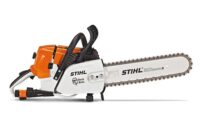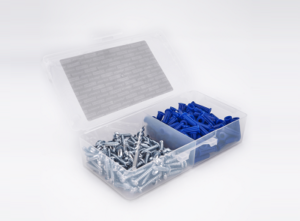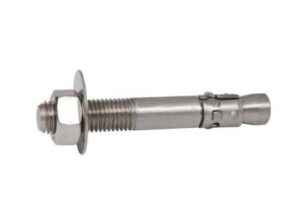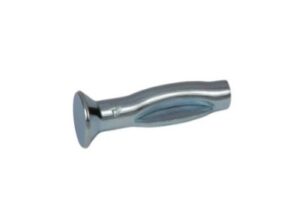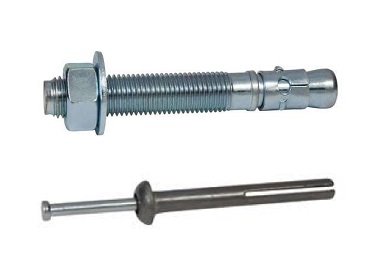 Get the job done right the first time by choosing the best masonry anchors for the application. A masonry anchor is used to secure or attach an item to a type of masonry or concrete block. These concrete anchors are as popular for DIY projects as they are for complex construction projects. For example, masonry anchors are commonly used to attach furring strips to a block wall, attaching shelf brackets to a masonry wall and signs at a local stadium.
Get the job done right the first time by choosing the best masonry anchors for the application. A masonry anchor is used to secure or attach an item to a type of masonry or concrete block. These concrete anchors are as popular for DIY projects as they are for complex construction projects. For example, masonry anchors are commonly used to attach furring strips to a block wall, attaching shelf brackets to a masonry wall and signs at a local stadium.
Masonry anchors are used in:
- Concrete base material
- Brick base material
- Block base material
- CMU base material
The three basic types of masonry anchors are:
- Expansion anchors, such as the wedge anchor or sleeve anchor
- Threaded anchors, such as the Tapcon, or masonry screw
- Epoxy fasteners
Expansion Masonry Anchors
Expansion masonry anchors, sometimes called anchor bolts, are anchors that expand putting force against the wall of the hole in the base material. The expansion masonry anchor is designed to go into a pre-drilled pilot hole in the base material. Once expanded, the fastener will not come out.
Types of Masonry Expansion Anchors
There are two different types of expansion masonry anchors designed for different applications:
Male masonry expansion anchors penetrate the base material and stick up from the surface.
Female masonry expansion anchors sit flush with the base material and expand or complete the fastening by having some type of bolt inserted into them.
Different Concrete Fasteners for Different Types of Masonry
Masonry anchors have important differences. Some masonry anchors are designed to be used in a variety of masonry base material such as solid concrete, brick or block; while others can only be used in only solid concrete. The masonry anchors that are made for use only in solid concrete will give more consistent holding values and stronger pull-out values in concrete than the other masonry anchors that can be used in all three base materials.
Wedge Anchors
The wedge anchor is a male masonry expansion anchor for use in solid concrete. Diameters range from 1/4” to 1-1/4” and lengths from 1-3/4” to 12”. Wedge anchors are made from zinc plated carbon steel, hot-dipped, galvanized, 303 stainless steel and 316 stainless steel.
Sleeve Anchors: The sleeve anchor is a male masonry expansion anchor that is installed into concrete, brick or block base material. They can be used in the mortar joint, and the pull-out value is based on the amount and quality of the mortar. The sleeve anchor is a popular masonry fastener because of the variety of masonry it can be used in. It is made in a wide range of diameters from 1/4” to 3/4” and can be bought in lengths from 5/8” to 6-1/4”. A sleeve anchor comes in four head styles: acorn head, hex head, flat head and round head. It is made from zinc plated carbon steel and 304 stainless steel.
Tapcon
Concrete screws are a threaded product with either a hex head washer or flat Phillips countersunk head. Masonry screws tap threads into a pre-drilled pilot hole in a base material of concrete, brick or block. The tapcon brand concrete screw is a threaded anchor that taps threads into the base material of brick, concrete or block. The tapcon concrete screw is a male anchor that comes in a wide range of diameters from 3/16” to 3/4” and in lengths from 1-3/4” long to 6” long. Masonry screw anchors are available in two different head styles designed for different types of applications.
If the application calls for the head to be countersunk in the material being fastened then the flat countersunk Phillips screw should be used. If the head of the screw will be on top of the surface of the material being fastened then the hex washer head should be used. Concrete screws are available in the standard blue Climaseal coating or in the 410 stainless steel also coated with a silver Climaseal.
Drop-in Anchors
These are female expansion type anchors that can only be used in solid concrete wall. The expansion of the drop-in anchor is done through use of a setting tool. A different size setting tool is used with each different diameter of drop-in anchor. The drop-in anchors come in five different diameters of 1/4”, 3/8”, 1/2”, 5/8” and 3/4”. Each diameter of drop-in anchor has only one length available. The drop-in anchor is made in the standard zinc coated carbon steel, 304 stainless steel and 316 stainless steel.
Hammer Drive Anchors
The hammer drive anchor is a male fastener that can be used in solid concrete wall, solid brick or solid block. Hammer drive anchors are expanded by a pin that is hammered into the anchor body that expands it against the walls of the base material. Hammer drive anchors come in two diameters of 3/16” and 1/4”. They are available in one head style called a mushroom head. The mushroom head is tamper-proof because once the pin is set in then the anchor cannot be removed. The length of the mushroom head hammer drive anchors range from 3/4” to 3”.
Lag Shield Anchors
Lag shields are a female type expansion anchor that require the use of a lag screw inserted into them for the lag shield to expand. The lag shields also come in two lengths: a short lag shield or a long lag shield. The short lag shield is used in applications where the base material is very hard and the short lag shields are used in applications where the base material is softer. Both lengths of lag shields come in six diameters.
Strike Anchors
Strike anchors are male type expansion anchors for use in solid concrete only. These strike anchors use a pin for expansion and have a nut and washer for attaching the fixture to the concrete. Strike anchors come in diameters ranging from 1/4” to 3/4” with lengths from 1-3/4” to 6”. They are plated with a yellow zinc coating. The strike anchor is not available in either a stainless steel or hot-dipped galvanized. Once the pin is set, the anchor is designed for holding power and will not go in or come out of the concrete.
Split Drive Anchors
Split drive anchors are a male type anchor for use in concrete only. They are available in one diameter of 1/4” and in lengths from 1-1/2” to 4”. Zinc plated carbon steel is the only material that they are made from. They are not available in either hot-dipped galvanized or stainless steel. The split drive anchor comes in either a round headed or a flat Philips head which is countersunk.
Concrete anchors may have a light duty to heavy-duty performance which depends on the bearing weight of the wall that they are attached to.
Shear load describes the amount of downward force gravity and also the weight an object exerts on the anchor.
Tensile load is the amount of force required for pull-out of the anchor straight out of the hole.
Static loads are created by objects that never move and constantly exert the same force.
Dynamic loads are created by objects that either move or vibrate.
Impact loads are created when weight is increased suddenly.
Installation of the Best Masonry Anchors:
- When installing any masonry anchor, you must use a hammer drill with a masonry bit.
- Drill a pilot hole regardless of which types of concrete anchors you use.
- Have extra masonry drill bits ready
- Use either a can of compressed air or a blower to clear dust from the drilled hole
- Wear both safety goggles and a dust mask when drilling as a safety precaution
- You may need to have DIY projects reviewed by a professional when needed.
Concrete Fastening Systems, Inc. has been selling concrete fasteners for over 30 years from a fully stocked warehouse in Cleveland, Ohio. Free, same-day shipping in every length and diameter is available by ordering at www.confast.com, followed by product delivery within 1-3 days.

